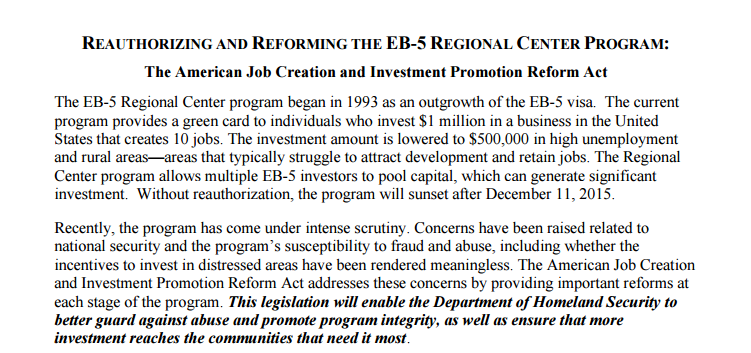REAUTHORIZING AND REFORMING THE EB-5 REGIONAL CENTER PROGRAM: The American Job Creation and Investment Promotion Reform Act

The EB-5 Regional Center program began in 1993 as an outgrowth of the EB-5 visa. The current program provides a green card to individuals who invest $1 million in a business in the United States that creates 10 jobs. The investment amount is lowered to $500,000 in high unemployment and rural areas—areas that typically struggle to attract development and retain jobs. The Regional Center program allows multiple EB-5 investors to pool capital, which can generate significant investment. Without reauthorization, the program will sunset after December 11, 2015.
Recently, the program has come under intense scrutiny. Concerns have been raised related to national security and the program’s susceptibility to fraud and abuse, including whether the incentives to invest in distressed areas have been rendered meaningless. The American Job Creation and Investment Promotion Reform Act addresses these concerns by providing important reforms at each stage of the program. This legislation will enable the Department of Homeland Security to better guard against abuse and promote program integrity, as well as ensure that more investment reaches the communities that need it most.
Drafted and supported by Senate Judiciary Committee Ranking Member Patrick Leahy (D-Vt.) and Chairman Chuck Grassley (R-Iowa.), as well as House Judiciary Chairman Bob Goodlatte (R-Va.), Ranking Member John Conyers (D-Mi.), Immigration Subcommittee Ranking Member Zoe Lofgren (D-Ca.) and Congressman Darrell Issa (R-Ca.), this bicameral, bipartisan proposal would:
Extend the program through September 2019;
Provide increased authority to DHS to deny or terminate applications where there is fraud, criminal misuse, or a threat to public safety or national security;
Establish an “EB-5 Integrity Fund” in which regional centers and investors would pay fees to be used by DHS to conduct audits and site visits to detect and investigate fraud in the United States and abroad;
Require background checks of regional center and project principals;
Require more disclosures to investors regarding business risks and conflicts of interest;
Require more oversight of projects and closer monitoring for securities compliance;
Strengthen the incentives for investment in distressed areas so more capital investment reaches urban poor and rural areas, as Congress originally intended;
Raise the lower investment threshold to $800,000 to ensure more money goes to the areas that need it, and provide a mechanism for automatic adjustments going forward;
Improve how jobs are calculated to ensure that EB-5 projects truly create the statutorily required 10 jobs per investor;
Improve accountability and transparency by requiring that DHS employees document certain communications and by prohibiting preferential treatment; and
Decrease petition processing times, which have been plagued by massive delays, by providing premium processing and requiring fees be adjusted to the rate necessary to achieve efficient processing.
This proposal is supported by Invest in the USA (IIUSA), by far the largest and oldest trade association representing EB-5 regional centers and stakeholders, with members responsible for over 95 percent of the EB-5 investment nationwide. It is also supported by the Leadership Conference on Civil and Human Rights (LCCR) and supported by the More American Jobs Alliance (MAJA).
http://www.leahy.senate.gov/imo/media/doc/EB5%20reform%20One%20Pager.pdf
Mentions
Videos





Subscribe for News
Site Digest
Join Professionals on EB5Projects.com →
Securities Disclaimer
This website is for informational purposes only and does not constitute an offer or solicitation to sell shares or securities. Any such offer or solicitation will be made only by means of an investment's confidential Offering Memorandum and in accordance with the terms of all applicable securities and other laws. This website does not constitute or form part of, and should not be construed as, any offer for sale or subscription of, or any invitation to offer to buy or subscribe for, any securities, nor should it or any part of it form the basis of, or be relied on in any connection with, any contract or commitment whatsoever. EB5Projects.com LLC and its affiliates expressly disclaim any and all responsibility for any direct or consequential loss or damage of any kind whatsoever arising directly or indirectly from: (i) reliance on any information contained in the website, (ii) any error, omission or inaccuracy in any such information or (iii) any action resulting therefrom.


